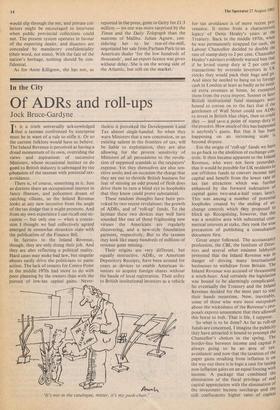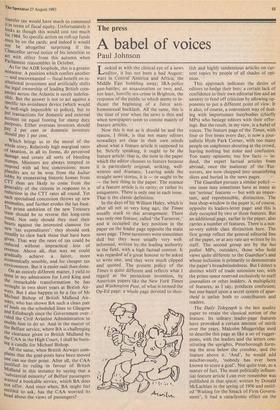In the City
Of ADRs and roll-ups
Jock Bruce-Gardyne
t is a truth universally acknowledged
It
a taxman confronted by enterprise must be in want of a rule to stifle it. Or so the current folklore would have us believe. The Inland Revenue is perceived as having a dread momentum of its own, overriding the views and aspirations of successive Ministers, whose occasional instinct to do gourd to British industry is sabotaged by the Ipbsepion of the taxman with potential tax- avoidance.
There is, of course, something in it. Just as doctors share an occupational interest in fancy illnesses, and policemen dream of catching villains, so the Inland Revenue looks at any new incentive from the angle of the tax dodge that it might promote. And from my own experience I can recall one oc- casion — but only one — when a conces- sion I thought we had collectively agreed emerged in somewhat shrunken state with the publication of the Finance Bill.
In fairness to the Inland Revenue, though, they arc only doing their job. And they are also reflecting a political reality. Hard cases may make bad law, but singular abuses easily drive the politicians to panic action. The lack of tenants for Centre Point in the middle 1970s had more to do with poor planning by the owners than with the pursuit of low-tax capital gains. Never-
theless it provoked the Development Land Tax almost single-handed. So when they warn Ministers that a new concession, or an existing salient in the frontiers of tax, will be liable to exploitation, they are also allowing for the proven sensitivity of Ministers of all persuasions to the revela- tion of supposed scandals at the taxpayers' expense. Yet they themselves are also sen- sitive souls; and on occasion the charge that they are out to throttle British business for fear of missing an odd pound of flesh does drive them to turn a blind eye to loopholes that they know could prove substantial.
These random thoughts have been pro- voked by two recent revelations: the growth of ADRs, and of `roll-up' funds. To the layman these two devices may well have sounded like one of those frightening new viruses the Americans are regularly discovering, and a new-style foundation garment, respectively. But to the taxmen they look like many hundreds of millions of revenue gone missing.
Their origins are very different, but equally instructive. ADRs, or American Depository Receipts, have been around for years as devices to enable American in- vestors to acquire foreign shares without the hassle of local registration. Their utility to British institutional investors as a vehicle
'11's not in the catalogue, mister, it's my push-chair.'
for tax avoidance is of more recent pro' venance. It stems from a characteristic legacy of Denis Healey's years at the Treasury. Back in the middle 1970s, when he was permanently strapped for cash, the Labour Chancellor decided to double the rate of stamp duty to 2 per cent. Chancellor Healey's advisers evidently warned him that if he levied stamp duty at 2 per cent on transactions by overseas investors in UK stocks they would pack their bags and go. And since he needed to hang on to foreign cash in London at least as badly as he need" ed extra revenues at home, he exempted them from the extra impost. Sooner or later British institutional fund managers were bound to cotton on to the fact that if the gentlemen of Wall Street could use ADRs to invest in British blue chips, then so could they — and save a point of stamp duty in the process. How much of this has happened is anybody's guess. But that it has been happening on an increasing scale is beyond dispute.
For the origin of `roll-up' funds we have to go back to the abolition of exchange con- trols. It then became apparent to the Inland Revenue, who were not born yesterday, that it would be possible for UK residents to use offshore funds to convert income into capital and benefit from the lower rate of tax (an attraction which was further enhanced by the forward indexation of capital gains two-and-a-half years later). This was among a number of potential loopholes created by the ending of ex- change controls which they proposed to block up. Recognising, however, that this was a sensitive area with substantial com- merical interests at stake, they took the wise precaution of publishing a consultation document first.
Great angst followed. The accountancy profession, the CBI, the Institute of Direc- tors and several other eminent lobbyists protested that the Inland Revenue was in danger of driving many international businesses to withdraw from Britain. The Inland Revenue was accused of threatening a witch-hunt. And certainly the legislation was bound to be alarmingly complicated. So eventually the Treasury and the Inland Revenue decided for the most part to stay their hands meantime. Now, inevitably, some of those who were most outspoken about the wickedness of the Revenue's pro- posals express amazement that they allowed this horse to bolt. That is life, I suppose.
So what is to be done? As far as roll-uP funds are concerned, I imagine the publicity they have attracted is bound to preempt the Chancellor's choices in the spring. The border-line between income and capital is always going to be an area of tax- avoidance: and now that the taxation of the paper gains resulting from inflation is on the way out there is in logic a case for taxing non-inflation gains on an equal footing with income. A package that combined the elimination of the fiscal privilege of real capital appreciation with the elimination of the investment income surcharge and the still confiscatory higher rates of capital transfer tax would have much to commend a In terms of fiscal equity. Unfortunately it looks as though this would cost too much for 1984. So specific action on roll-up funds must be on the cards: and indeed it would not be altogether surprising if the Chancellor served notice of his intention to act with effect from this autumn when Parliament reassembles in October.
As for the ADR loophole, this is a greater nonsense. A position which confers another and uncovenanted — fiscal benefit on in- stitutional investment and artificially shifts the legal ownership of leading British com- panies across the Atlantic is surely indefen- sible. But the answer is not to act against a specific tax-avoidance device (which would be well-nigh impossible to police), but to Put transactions for domestic and external account on equal footing for stamp duty Purposes. Either overseas investors should pay 2 per cent or domestic investors should pay I per cent.
Which brings us to the moral of the whole story, Relatively high marginal rates of taxation, in all its forms, do perceived damage and create all sorts of bleeding stumps. Ministers are always tempted to respond with ad hoc concessions: more Plaudits are to be won from the kultur lobby by exonerating historic homes from CTT than are likely to come from the generality of the citizens in response to a reduction in the CTT rates all round. Yet each specialised concession throws up new anomalies, and further erodes the tax base. The prime ambition of the new Treasury team should be to reverse this long-term trend. Not only should they steel their hearts against the interested clamour for new 'tax expenditures': they should seek steadily to claw back those that have been given. That way the rates of tax could be reduced without impractical loss of revenue. Above all, that way we could gradually achieve a fairer, more economically sensible, and far cheaper tax environment. But it is easier said than done.
On an entirely different matter, I yield to none in my admiration for Lord King and the remarkable transformation he has wrought in two short years at British Air- w,ays. But 1 also happen to be a fan of Mr Michael Bishop of British Midland Air- ways, who has shown BA such a clean pair of heels on the scheduled lines to Glasgow and Edinburgh since the Government over- / ruled the Civil Aviation Administration to enable him to do so. And in the matter of the Belfast service, where BA is challenging the clearance given to British Midland by the CAA in the High Court, I shall be burn- ing a candle for Michael Bishop. All the same, when British Airways com- plains that the goal-posts have been moved One can see their point. After all, the CAA Justified its ruling in favour of British Midland in this instance by saying that a 'substantial minority' of Belfast passengers wanted a bookable service, which BA does not offer. And since when, BA might feel entitled to ask, has the CAA worried its head about the views of passengers?



































 Previous page
Previous page